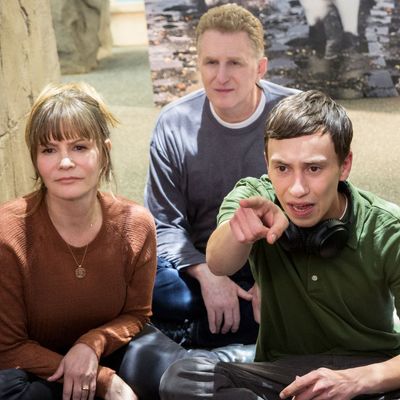
In its second season, Atypical expands its scope and loses some of its focus. It’s still a dramedy about Sam Gardner (Keir Gilchrist), a teenager with autism, and the effect that his autism has on the rest of his family. But in the ten episodes that debut Friday on Netflix, the series becomes more of an ensemble piece as the issues faced by Sam’s sister Casey (Brigette Lundy-Paine) and his parents, Elsa (Jennifer Jason Leigh) and Doug (Michael Rapaport), begin to take up as much narrative space as Sam’s attempt to navigate his senior year of high school. The result is distinguished by admirably low-key performances, much like in season one, but it doesn’t rise to the level of must-watch.
The second outing picks up more or less where Atypical left off at the end of season one. Elsa and Doug are still wrestling with the fallout from Elsa’s extramarital affair, which has resulted in their separation and the driving of a firm wedge between Elsa and her children, especially her daughter. Casey has started attending a prestigious private school on a track scholarship, where she has trouble fitting in with her new teammates and keeping up in a more academically rigorous environment. Sam is trying to find a new therapist after ending his sessions with Julia (Amy Okuda), the object of his inappropriate crush in season one, while also figuring out what he’ll do post-graduation. He still has trouble reading social cues, relies heavily on rituals, and tugs at his hair when he gets anxious. But his place on the spectrum is treated less like an issue with a capital-I this season and more like just one aspect of the busy, complicated life of a family.
In some ways, that’s a positive and feels more reflective of the way actual families function. When a child has special needs, every day at home doesn’t suddenly turn into a Very Special episode of television. It’s just another regular day, and Atypical innately understands that. And yet it’s impossible to witness the Gardners’ experiences and forget for even a second that they’re a family in a television show. Creator Robia Rashid (an alum of How I Met Your Mother and The Goldbergs) and her fellow writers aren’t making a traditional, multi-camera sitcom, but even though the rhythms and structure of Atypical are less formal, the things the characters say and do too often seem contrived or aim blatantly for the easy joke.
While Leigh infuses Elsa with a gentleness that makes her unceasing patience with her children seem believable, the character is scripted with a naivete that doesn’t ring true. She knows that her adultery caused immense pain to her husband, yet still seems genuinely shocked when he doesn’t immediately and warmly welcome her back into the fold. That attitude, as well as other swings in their marriage, don’t seem reflective of actual human behavior as much as predetermined beats that must be hit in certain episodes.
Sam’s best friend, Zahid (Nik Dodani), continues to play the role of horny wannabe ladies’ man who gives him terrible advice. Nearly everything Zahid says is supposed to be a laugh line, right down to a tossed-off reference to his Instagram handle — that would be @brownsugar_doinit — but it instead suggests the writers are trying way, way too hard to turn him into the show’s lovably wacky sidekick. Julia, another underdeveloped side character, shouldn’t even be in Atypical anymore since Sam is no longer her patient. Still, the show insists on periodically checking in with her and an unnecessary side plot about her pregnancy, just one example of bloat that weighs this season down in spots.
Atypical would be better off zeroing in on its two primary teen characters and the relationship between them, where it does a much better job of organic storytelling and benefits from two winning actors in those roles. As Sam, Gilchrist is a human laser beam who cuts through every room he’s in with intensely focused conversations — he remains fixated on penguins — and then abruptly exits. The things he says are often amusing, largely because he doesn’t realize they’re funny. Gilchrist never strays from his commitment to playing everything yard-stick straight.
Meanwhile, Casey can be extremely patient with her brother and totally irritated by him a moment later. Lundy-Paine does a wonderfully credible job of sliding between understanding and exasperation, particularly in episode nine, which takes place on Casey’s 16th birthday. I don’t always believe that Elsa and Doug are an actual married couple — the chemistry between Leigh and Rapaport doesn’t quite have the lived-in vibe of a husband and wife — but I never doubt that Sam and Casey are real siblings.
The final episode of season two throws a couple of curveballs that confirm this show doesn’t always veer toward the pat, happy outcome. But somehow, I never feel truly surprised by anything that happens in Atypical. It ambles along, showing us people struggling with the stuff of life without making that struggle compelling enough to make me fully invested in it. It does what Sam often does: walks into a room, says what it has to say, and then leaves, usually without making the kind of strong emotional connection that those watching and listening crave.


